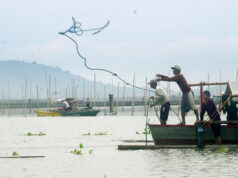Urban farmer pushes for regular training to help reduce waste
DAVAO CITY — An urban farming advocate is pushing for regular training sessions in the city not just to promote home gardening but to help reduce trash by turning biodegradable wastes into fertilizers.
Perfecto B. Rom, author of UCG A Home Farming Manual-With an Introduction to Household-based Waste Management and Food Security System, said he hopes to have a permanent learning garden with satellite sites in the communities, especially those that will be affected by the coastal road project.
“With gardening, you are not only solving the problem of waste but the food security and health and nutrition as well,” said Mr. Rom, who organized an Urban Container Gardening (UCG) Hands-On Seminar Workshop on July 14-15.
The concept involves teaching households to grow vegetables for their consumption and produce organic fertilizer, with the surplus to be collected and sold to commercial farmers.
By reducing garbage collected at the household level, the city might be able to delay the plan to build a waste-to-energy (WTE) plant to replace the existing sanitary landfill that is expected to be at full capacity in two years.
It is not yet time for a WTE, Mr. Rom said. “This is my opinion, food is a form of energy, biodegradable waste is a form of energy. If we keep burning that, we keep burning the energy to produce energy?… Why don’t we compost that and use micro-organisms to degrade that and bring that back to the mountains where those came from.”
Mr. Rom is referring to the proposed WTE project, which can accommodate about 600 metric tons of waste daily. The project is eyed as a joint venture between Nippon Steel, the city government, and Japan’s Kitakyusho City, which already uses the system.
“The reduction of waste is equivalent to the reduction of budget because with every one liter of waste collected, 50 centavos is thrown away,” said Mr. Rom, an agriculture degree graduate from Xavier University in Cagayan de Oro, with a major in crop science.
His UCG training covers container preparation and designing, a basic guide to sustainable home farming, organic bio-solid/liquid fertilizer and pesticide preparation, physical and chemical soil composition, planting/transplanting techniques, home farm planning exercises, and crop care and maintenance.
“We are excited to share to others the benefits of urban gardening… We will simplify sciences that are related to this urban container gardening.” — Maya M. Padillo



